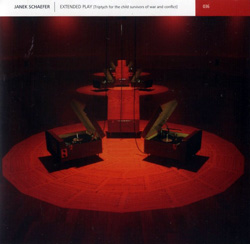
To the eyes of Janek Schaefer, "Tango tzyszakowskie", a Polish folk song once enlisted as a pigeon carrying secret messages through the radio-waves for members of the Polish underground during World War II, played no less a magnanimous role in another, admittedly markedly different, event: that of his mothers birth in the year 1942. The circumstances under which his mother was born being as different as they are from those which his own daughter now enjoys brings Schaefer to wonder at this notion of 'beginning' and all of its subtleties of gradation.
Schaefer finds in "Tango tzyszakowskie" a short rising musical phrase, and in bringing it to term in numerous ways, enables it to enjoy the possibility of a return. This it did as a part of The Huddersfield Contemporary Music Festival in 2007. Schaefer's score was emitted into the room through three retro record players, which were set at 33, 45, or 78rpm, and which would briefly pause in response to audience members as they passed through the exhibition. Apart from achieving a sort of historical significance owing to its origins, with this last point in mind, and the fact that all the while the medium itself can be heard, time passing through the grooves of the record player like rain tracing furrows through the dust, this sound-event also clearly occurs on the surface of the present age.
Both realms are clearly heard, and, in fact, they also interlace to fine effect over the course of the album. The former, that of history and its mournfulness, is heard in the slow, stylized gesture and motion of the instruments, as the nervy edge of the piano furls around the reflectiveness of the strings. But the picture is also a good deal more rich and intuitively complex than such stereotypical roles suggest. The formal poise of each piece contains remarkable fluidity of musical identity, continual transformations of mood and material that defines rather than jeopardizes coherence. The deflections, supple deviations and abrupt interruptions offered up by the device on which the music is played, and through which it is rehabilitated, not only makes this a more eerie, ambiguous experience � the sound so exhibited is now personal and impersonal, fluid and mechanical, disciplined and random � but, at least in part, it brings the music to another plane, a more contemporary one, wherein the medium trumps and ensnares the subject in the empty and functional place which was originally reserved for it.
Indeed, the device levers itself into the unfolding dialogue between piano and strings to such an extent and, similarly, on tracks four and five, the looping and layering of the mix is such that the distinction between triumphant return or arid recurrence is more or less blurred. To be sure, even divorced from it context, the album is quite simply beautiful, but just as for the Polish Underground "Tango tzyszakowskie" harbored a welter of encrypted messages beneath its refreshing refrain, so to does Schaefer's rendition for us today.
Comments and Feedback:
|



